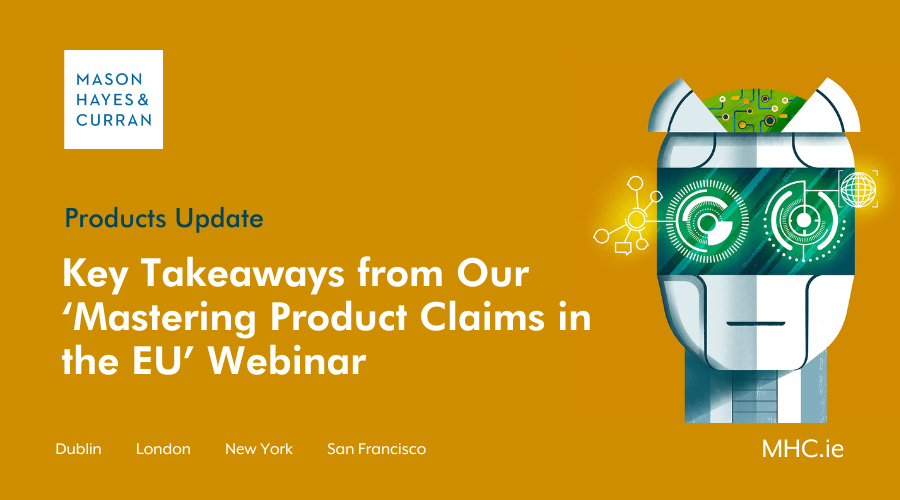Insights Food, Agriculture & Beverage
Key Takeaways from Our ‘Mastering Product Claims in the EU’ Webinar
Oct 23, 2024

Overview
- Businesses must navigate a complex landscape of overlapping legislation, which includes the EU Unfair Commercial Practices Directive, sector-specific Product Safety Laws, and various Advertising Codes of Conduct. This intricate framework sets the groundwork for how product claims are regulated in the EU.
- There is no unified definition of a product claim. However, it is broadly understood to encompass any statement, whether direct or indirect, that communicates information about a product. This includes both written and visual representations.
- It is essential for businesses to accurately classify their products to determine which specific regulations apply, including understanding both general obligations and any sector-specific requirements.
Unfair Commercial Practices Directive (UCPD)
- The UCPD provides a framework designed to protect consumers from misleading commercial practices which includes misleading product claims. It covers a wide range of entities identified as "traders" and extends to both goods and services.
- A practice can be deemed to be misleading if it contains false or untrue information. It can also be considered misleading if it fails to provide material information necessary for an average consumer to make an informed purchasing decision. Such omissions or inaccuracies could cause a consumer to take a transactional decision they would not have otherwise made. Depending on the context, this can include claims that provide information that is vague, unclear, delivered at an inappropriate time or in the absence of appropriate qualifications and/or substantiating evidence.
- The European Commission has developed guidance on the interpretation of the UCPD for traders to ensure their marketing practices comply in the context of things like environmental claims, obligations for online platforms, and best practices for influencer marketing.
Green claims
- Green claims refer to any assertion suggesting that a product has a positive environmental impact or is less harmful compared to competitors. This includes claims about sustainability and environmental friendliness.
- Two key pieces of legislation are currently relevant: the Green Transition Directive and the forthcoming Green Claims Directive. Regarding product claims, the former updates the UCPD, while the latter aims to introduce minimum standards for substantiating claims with robust scientific evidence. The Green Claims Directive is also expected to establish mandatory environmental labelling schemes.
Sector-specific guidance
- Different sectors, such as food including food supplements, medical devices, and cosmetics are governed by specific product safety frameworks and associated guidance in the EU. Each framework is tailored to address the unique features of those product sectors.
- It is crucial for businesses to present their products accurately with reference to any applicable sector-specific rules, especially regarding any health-related claims, as these are closely regulated and carefully scrutinised as a result.
Advertising standards
- Generally speaking, the advertising compliance landscape in the EU is also heavily influenced by various self-regulatory codes that communicate the basic principle that marketing practices be legal, decent, honest and truthful. National advertising codes in individual EU Member States tend to derive from and operate alongside guidance contained in a code published by the European Advertising Standards Alliance.
- In Ireland for example, the ASAI has a structured process for handling complaints, leading to decisions that, while self-regulatory, carry significant weight and influence within Ireland’s advertising landscape.
Branding issues and claims
- Trade marks serve not only as identifiers but can also convey claims about a product’s quality or origin. Misleading brand names, particularly in environmental contexts, can lead to legal repercussions.
- Recent cases underscore the risks associated with exaggerated green claims, highlighting that advertisements making such claims can be banned or removed for overstating their environmental benefits.
- Businesses are advised to substantiate claims like “Ireland’s number one” with credible third-party evidence to avoid misleading consumers and facing potential legal challenges.
Crossover and co-branding risks
- Co-branding is becoming increasingly popular. However, it can introduce risks related to misleading claims if not carefully managed. Companies must ensure that both partners are aligned in their messaging and compliance with regulations.
- Conducting thorough due diligence in co-branding arrangements is essential, especially concerning environmental claims, to prevent legal complications arising from misleading marketing practices.
Conclusion
The webinar concluded with practical insights for businesses looking to design compliant product claims in their European Union markets. Focus points included the importance of:
- Correct product classification
- Staying informed about evolving regulations, especially as they relate to issues like green claims and influencer marketing, and
- Options where competitors’ product claims may be in breach of EU or national law.
For further information and tailored expert guidance, businesses should reach out to the session presenters, Jamie Gallagher and Hazel McDwyer.
This summary is for informational purposes only and does not constitute legal or other professional advice.
Share this:


